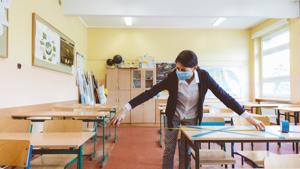WILL Study: Wisconsin school closures to cost kids $7 billion over lifetime

(The Center Square) – The Wisconsin Institute for Law and Liberty is releasing a new study that puts the cost for keeping schools closed last spring at over $7 billion.
Will Flanders, research director at WILL, said the number comes from study after study that shows less time in the classroom as well as a widening achievement gap hurts students in the long run.
“There are solid studies conducted over a number of years on how much lifetime earning decline from missing a year of school,” Flanders explained. “These have primarily been based on dropouts before COVID, obviously, but they are applicable here. We applied those numbers to the percentage of curriculum that each district says they missed during the spring semester.”
And that’s just from last spring.
Flanders says many schools in Wisconsin, including the largest district in Milwaukee, Madison, Racine and Kenosha kept kids learning from home for most of this year as well. Many of those kids continue to learn from home.
“This study takes a very conservative approach by accepting the notion that kids are learning at home,” Flanders said. “While we think that such learning is likely to be far more limited than in the traditional environment, we’re only using the percentage of curriculum that school districts admit to having missed out on. The learning loss is actually likely to be far more dramatic than what has been reported here.”
The biggest take away from the study is the loss-of-learning cost.
WILL puts that price tag at $899 million for Milwaukee Public Schools, $295 million for Racine Unified schools, $280 for Kenosha schools, and $271 million for both Madison and Appleton schools.
Those are not only the largest school districts in Wisconsin, they are some of the schools with the most minority students.
“We know from studies around the country that low-income and minority students are suffering the most from at-home schooling. Their families simply may not have the resources to supplement the learning that is being missed out on from virtual learning,” Flanders added. “Wisconsin’s largest cities have been failing minority families for decades, and keeping schools closed despite scientific evidence to the contrary is just the latest example.”
The study’s solution is to reopen schools, and focus on catching students up on the classes that they have missed.
“The best scientific evidence suggests that it is safe to reopen schools. What we have here are teachers unions standing against science,” Fanders told The Center Square. “Given this scientific evidence, it is our hope that quantifying some of these long-term costs will push policymakers harder to get schools going again.”
Disclaimer: This content is distributed by The Center Square



